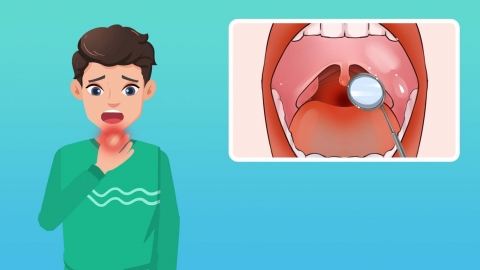Why does my throat hurt when I swallow saliva, and what should I do?
Generally speaking, the throat refers to the pharynx. Sore throat and pain when swallowing saliva may be caused by dietary irritation, excessive voice use, dry environment, acute pharyngitis, epiglottitis, and other reasons. Treatment options include general therapy and medication under a doctor's guidance. A detailed explanation is as follows:

1. Dietary Irritation
Consuming spicy, hot, sharp, or irritating foods, such as chili peppers, hot soup, or potato chips, can directly damage the pharyngeal mucosa, potentially causing congestion and swelling of the mucosa. When swallowing saliva, the contraction of throat muscles and friction with the damaged mucosa can cause pain. It is important to maintain a healthy and balanced diet and reduce the consumption of spicy, hot, and irritating foods.
2. Excessive Voice Use
Speaking loudly for prolonged periods, singing, or shouting can cause fatigue of the throat muscles and frequent vibration and friction of the vocal cords, leading to congestion and dryness of the pharyngeal mucosa and increased local sensitivity. During swallowing, the normal movement of the throat can stimulate the congested and dry mucosa, resulting in pain. Simple voice exercises, such as deep breathing and vocal relaxation training, can help improve the endurance and coordination of throat muscles and reduce throat damage caused by overuse.
3. Dry Environment
When the air humidity in the surrounding environment is low, the moisture in the pharyngeal mucosa can easily evaporate, potentially causing dryness and lack of lubrication. During swallowing, the dry mucosa may rub against each other, stimulating nerve endings and causing pain. It is recommended to use a humidifier to increase indoor air humidity.
4. Acute Pharyngitis
Acute pharyngitis is mainly caused by viral or bacterial infections. After infection of the throat, inflammatory factors can stimulate the pharyngeal mucosa, making it congested and sensitive. During swallowing, the movement of throat muscles and the flow of saliva can irritate the inflamed area, causing pain. Symptoms may also include fever and fatigue. Under a doctor's guidance, medications such as Cefadroxil Granules, Amoxicillin Capsules, and Roxithromycin Dispersible Tablets may be used for treatment.
5. Epiglottitis
Epiglottitis is mostly caused by bacterial or viral infections and can also be triggered by trauma, allergies, or other factors. Inflammation can cause swelling of the epiglottis. When swallowing saliva, the liquid passing over the swollen epiglottis can stimulate nerve endings, causing pain. Patients may also experience difficulty swallowing and hoarseness. Under a doctor's advice, patients can use medications such as Dexamethasone Sodium Phosphate Injection, Prednisone Acetate Tablets, and Yinhuang Tablets for treatment.
In daily life, it is important to strengthen physical exercise, enhance physical fitness, and improve immune function to reduce the likelihood of respiratory infections. Additionally, maintaining good oral hygiene by brushing teeth properly in the morning and evening, and cultivating healthy lifestyle habits, such as avoiding staying up late and excessive fatigue, are also essential.








